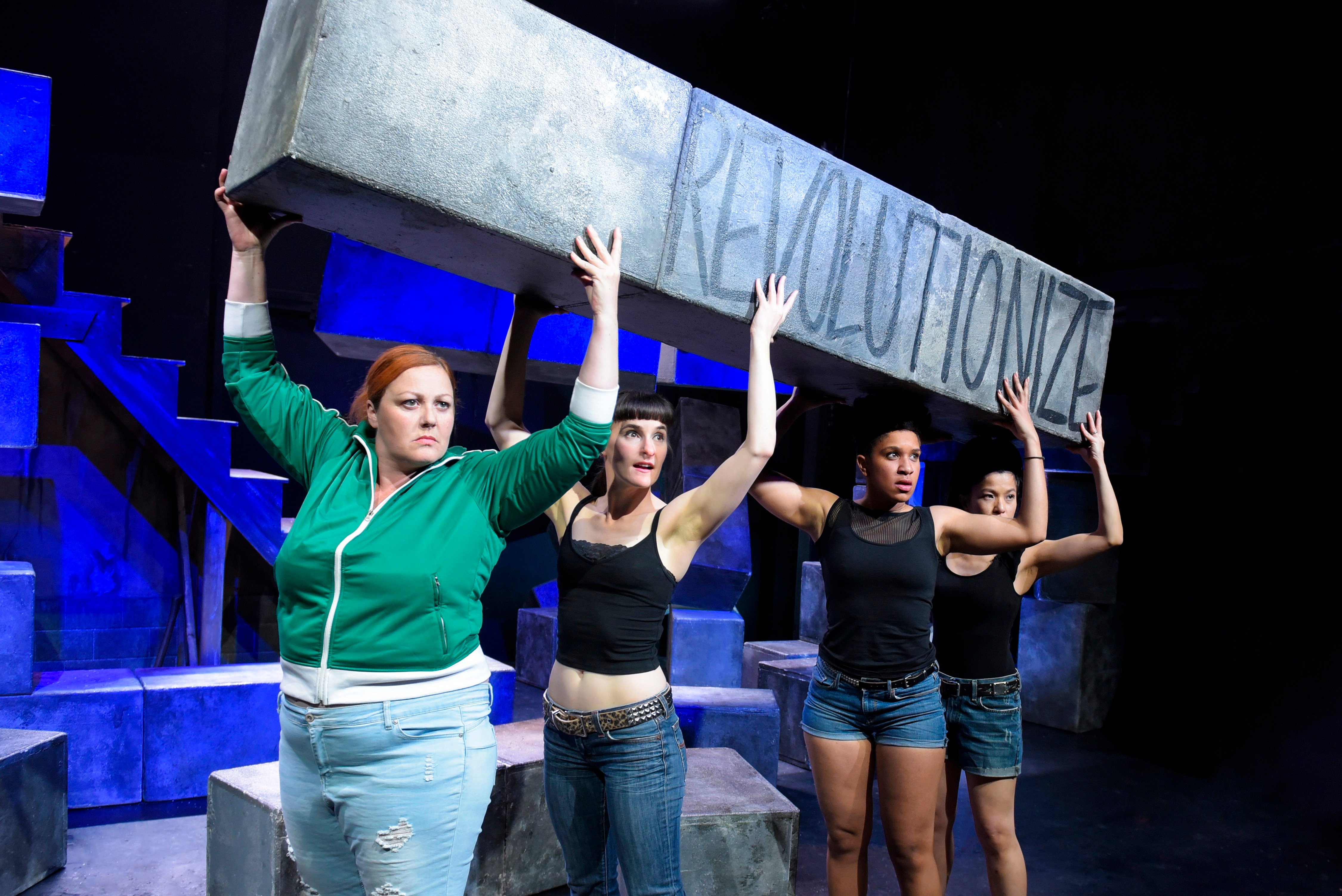The new ensemble piece from San Francisco’s Crowded Fire Theater offers much in terms of visceral, shocking imagery, but fails to make its intended impact. The new play by Alice Birch, “Revolt. She Said. Revolt Again.” devolves quickly from a pseudo-absurdist commentary on gender roles into a statement about killing all the men in the world. It lacks gravitas in a number of muddy scenes in the middle and renders too strong of a statement in the end as it turns into a exceedingly messy, nebulous piece with no true grounding. It still nonetheless forces the audience out of their comfort zones and into a place where these questions can be confronted — yet no true questions are raised. Where it succeeds in execution, “Revolt” falls flat in terms of making any viable suggestions for progress other than “fight back against men.”
It’s an ambitious project, especially for an audience that might be familiar with Crowded Fire’s more traditional works — even if many of them are not really traditional at all. The play quickly pits the women against the men, which is where the piece seems to fail. Even though tearing the patriarchy is made in attempt through acts of violence against the male members of the cast, it comes across as gratuitous rather than effective. The set is slowly torn down scene by scene as stage blood suddenly soils the pants of the women in the cast, forcing the audience to consider their immediate reactions to what is blatantly portrayed as period stains. This was ultimately the most potent and salient of bold artistic choices by director Rebecca Novick, as it even forced me to consider my own reaction to the rapidly-appearing stains — one audience member even walked out. It was literally a bloody mess, and rightfully so — as the men called the women names, the stark juxtaposition between the confident women and the societally disproved state of attire was jarring but empowering. Nevertheless, beyond the physical tearing down of the set, there was nothing tangible for me to hold onto in terms of takeaways — “Revolt” began to preach to the choir.
The production was surprisingly humorous, highlighting the ridiculousness of some of the situations that women are placed in. Simple requests are rendered as the most complicated of questions when asked to men, who can’t seem to wrap their heads around it due to privilege. “Revolt” questions innate perceptions of language, particularly sexual language that we see as normal and acceptable, because they’re only acceptable since they’re so engrained. “Revolt” performs a light linguistic deconstruction of customs of marriage proposals and the action of “putting” one’s hand on another person — both acts of claiming of property that reflect the proprietary male position in a relationship. It’s funny, surprisingly relatable, but yet absurd at the same time. No heterosexual couple would ever actually have these conversations, and yet, it makes sense and raises questions about how we view these relationships in society today.
“Revolt” also raises more questions than it does provide answers about gender and sex. Reading the program, at least one of the actors uses they/them pronouns, yet the entire piece is about the dichotomy between men and women. It’s not innately transphobic or otherwise, but it specifically focus on the lens of femme, female-identifying individuals (of whom may possess vaginas, as indicated in the aforementioned section), utilizing strong delineations in pronouns and women versus men. It’s tough to reconcile this, especially with such a statement in the end as literally kill all the men — because where does that get us and does this piece end up becoming too split along somewhat irrelevant dichotomous lines? The piece separates rather than unites on a gender spectrum that I felt unsettled by the ideas it presented. Admittedly, it’s hard to confront all of these in a single piece, especially one around 90 minutes long (and even famous pieces like “The Vagina Monologues” suffer from criticism surrounding transphobia, a lack of inclusion and the like), but the explicitness of the women versus men divide was stark and a bit of a turn off for me as an audience member seeking a progressive piece that will place forth fresh ideals, especially for a boundary-pushing theater such as Crowded Fire.
Contact Olivia Popp at oliviapopp ‘at’ stanford.edu.
